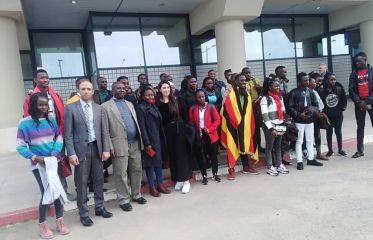Breaking News
- Flexible Remote Work Opportunity for University Students: Earn $100–$250 Per Month ...Read More
- Ministry of Education and Sports Azerbaijan Government Scholarships For 2025-2026 Academic Year ...Read More
- Government Sponsorship Undergraduate Admission Lists 2025-26 for Makerere University ...Read More
- Ministry of Education And Sports: Egyptian Government Scholarships 2025-2026 Academic Year ...Read More
- Ground Breaker Full Scholarship for girls to study Software Engineering 2025 July Intake ...Read More
- Tony Elumelu Foundation Entrepreneurship Programme (TEEP) 2025 for young African Entrepreneurs ...Read More
- DESIGNING FUTURES 2050 International Design Competition 2025 (€15,000 prize) ...Read More
- Ground Breaker Full time Scholarship for girls to study Software Engineering 2025 Intake ...Read More
- Ministry of Education And Sports Algerian Vocational Training Scholarships for 2024-2025 AY ...Read More
- Ministry of Education and Sports Advert for the Algerian Government Scholarships for 2024-2025 ...Read More
Japan Africa Dream Scholarship Program 2020 for young Africans to study in Japan (Fully Funded)

Deadline:October 31, 2019
The Japan Africa Dream Scholarship (JADS) Program is a capacity building project by the AfDB and Japan which was initiated in 2017 with the aim of providing two-year scholarship awards to highly achieving African graduate students to enable them to undergo post-graduate studies (i.e. a two-year Master’s degree program) in selected priority development areas on the continent and Japan.
The overarching goal the AfDB and the Government of Japan seek to attain is to enhance skills and human resources development in Africa in under the Bank’s High 5s agenda (i.e. “Feed Africa”, “Light up Africa”, “Industrialize Africa”, “Integrate Africa” and “Improve the quality of life of the people of Africa”) and key Japanese development assistance initiatives. JADS core areas of study focus include energy, agriculture, health, environmental sustainability, and engineering. The program also seeks to promote inter-university collaboration and university-industry partnerships between Japan and Africa. Upon completion of their studies, the JADS scholars are expected to return to their home countries to apply and disseminate their newly acquired knowledge and skills in the public and private sectors, and contribute to national and continental socio-economic development.
Requirements:
Broadly speaking, nationals of African countries must:
• Be a national of a AfDB member country;
• Be in good health;
• Hold a Bachelor (or equivalent) degree in the energy area (or related field) earned at least 1 years prior to the application deadline date;
• Have 1 years or more of recent development-related experience after earning a Bachelor (or equivalent) degree;
• Be accepted unconditionally to enroll in the upcoming academic year in at least one of the JADS partner universities for a Master’s degree;
• Applicants living or working in a country other than his or her home country are not eligible for scholarships.
• JADS does not support applicants who are already enrolled in graduate degree programs.
• Not be an Executive Director, his/her alternate, and/or staff of all types of appointments of the African Development Bank Group or a close relative of the aforementioned by blood or adoption with the term “close relative” defined as: Mother, Father, Sister, Half-sister, Brother, Half-brother, Son, Daughter, Aunt, Uncle, Niece, or Nephew.
Selection Criteria
The JADS program uses the following four main factors and the degree of cohesion, to review eligible scholarship applications, with the aim of identifying the candidates with the highest potential, after completion of their graduate studies, to impact the development of their countries.
1. Quality of Education Background
2. Quality of Professional Recommendations
3. Quality of Professional Experience
4. Quality of Commitment to your Home Country
5. Quality of Statement of Purpose
Scholarship Benefits:
The JADS Scholarship provides the recipient with the following benefits:
• Economy class air travel between your home country and the host university at the start of the study program and immediately following the end of the scholarship period.
• Tuition for a graduate program and the cost of basic medical insurance usually obtained through the university.
• A monthly subsistence allowance to cover living expenses, including books.
For scholars engaged in research, a special grant may be available for research and thesis preparation. In special circumstances, computer literacy, preparatory language and other similar courses may be covered under the scholarship. Please note all JADS scholarships cover the duration of the graduate program or two years, whichever is less.
The JADS Scholarship does not cover:
• VISA application(s) costs
• Expenses to bring and/or support scholar’s family members;
• Extra-curricular courses or training;
• Language training not provided by the graduate program;
• Additional travel during the course of the study program;
• Expenses related to supplementary educational materials, field trips, participation in workshops/seminars, or internships; or
• Educational equipment such as computers.
Application Procedure:
1. Applicant completes JADS application form
2. Applicant sends documents (application form, university transcripts and certificate, CV, professional references and research proposal), to the JADS Secretariat for first screening through JADS@AFDB.ORG
3. JADS Secretariat sends shortlist of candidates to selected Japanese universities
4. Universities does second screening and share selected students with JADS Secretariat
5. JADS Secretariat recommends awardees based on its selection criteria to the Japanese Executive Director for approval.
6. AfDB contacts selected awardees, and informs partner universities.
For More Information:
Visit the Official Webpage of the AfDB Japan Africa Dream Scholarship (JADS) Program
Top Courses Currently Admitting
-
Bachelor of Science in Fisheries and Aquaculture
Makerere University
-
Bachelor of Engineering (Electrical)
Ndejje University
-
Diploma in Midwifery (Direct)
St Francis Schools of Health Sciences
-
Post Graduate Diploma Health Innovation Management (Weekend)
Clarke International University
-
Diploma in Clearing, Forwarding and Shipping Management
Management and Training Advisory Center (MTAC)





























